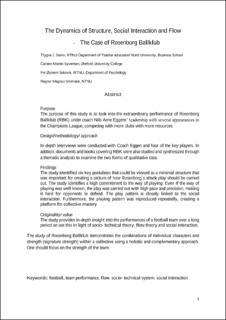| dc.contributor.author | Steiro, Trygve | |
| dc.contributor.author | Syvertsen, Carsten Martin | |
| dc.contributor.author | Saksvik, Per Øystein | |
| dc.contributor.author | Vennatrø, Ragnar Magnus | |
| dc.date.accessioned | 2022-09-06T12:37:49Z | |
| dc.date.available | 2022-09-06T12:37:49Z | |
| dc.date.created | 2022-02-26T14:21:10Z | |
| dc.date.issued | 2022 | |
| dc.identifier.citation | Team Performance Management. 2022, 28 (1/2), 95-108. | en_US |
| dc.identifier.issn | 1352-7592 | |
| dc.identifier.uri | https://hdl.handle.net/11250/3016032 | |
| dc.description.abstract | Purpose
The purpose of this study is to look into the extraordinary performance of Rosenborg Ballklub (RBK) under coach Nils Arne Eggens’ leadership with several appearances in the Champions League, competing with more clubs with more resources.
Design/methodology/approach
In-depth interviews with the coach and key players. Also combining with document studies.
Findings
This study identified six key postulates that could be viewed as a minimal structure that was important for creating a picture of how Rosenborg’s attack play should be carried out. This study identifies a high commitment to the way of playing. Even if the way of playing was well known, the play was carried out with both a high pace and precision, making it hard for opponents to defend. The play pattern is closely linked to social interaction. Furthermore, the playing pattern was reproduced repeatedly, creating a platform for collective mastery.
Research limitations/implications
The current study provides a detailed insight into the development of performance within a football club using different approaches. However, creating a common picture of what should be performed.
Practical implications
The current study can provide insight to football clubs but also other teams identifying a common pattern based on certain values.
Social implications
The study of Rosenborg Ballklub demonstrates the combinations of individual characters and strength (signature strength) within a collective using a holistic and complementary approach. One should focus on the strength of the team.
Originality/value
Original in understanding the way RBK performed. It also demonstrates a unique insight in applying flow theory as a means of developing a football team. | en_US |
| dc.language.iso | eng | en_US |
| dc.publisher | Emerald | en_US |
| dc.title | The Dynamics of Structure, Social Interaction and Flow - The Case of Rosenborg Ballklub | en_US |
| dc.type | Peer reviewed | en_US |
| dc.type | Journal article | en_US |
| dc.description.version | acceptedVersion | en_US |
| dc.source.pagenumber | 95-108 | en_US |
| dc.source.volume | 28 | en_US |
| dc.source.journal | Team Performance Management | en_US |
| dc.source.issue | 1/2 | en_US |
| dc.identifier.doi | https://doi.org/10.1108/TPM-05-2021-0037 | |
| dc.identifier.cristin | 2005698 | |
| cristin.ispublished | true | |
| cristin.fulltext | preprint | |
| cristin.fulltext | preprint | |
| cristin.qualitycode | 1 | |
